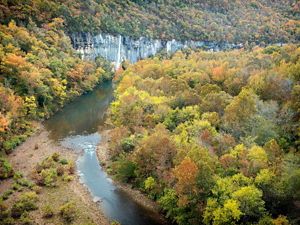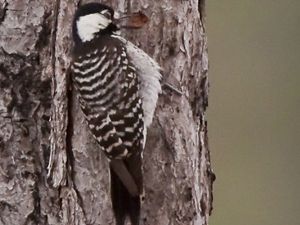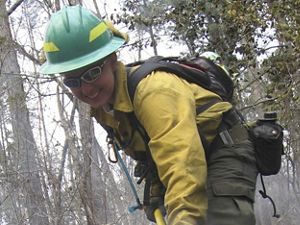
Your support has been instrumental in preserving the natural beauty and biodiversity of Arkansas. On behalf of our staff and trustees, I extend our heartfelt thanks. Together, we have much to celebrate.
Your support translates into river miles protected, trees planted, acres conserved and so much more. It’s your gifts and commitment to our mission that make this work possible.
As we look to the future, we are excited about the opportunities ahead and the positive impact we can achieve. Together, we are creating a legacy of conservation that will benefit generations to come.
Roger W. Mangham, Arkansas State Director
Fall 2024 Highlights

Transforming Floodplains and Forests
TNC has been working for decades with landowners to protect and restore forested wetlands in the Mississippi River Delta. Led by Jason Milks, TNC’s director of U.S. reforestation, we aim to reforest hundreds of thousands of acres in the Delta’s 100-year floodplain to improve flood resiliency and recreational opportunities while providing solutions to landowners.
Accomplishing a vision like this often happens one great project at a time. This year, we worked with Max Woodfin to turn 160 acres of his frequently flooded farmland back into forest by planting 36,000 seedlings in the ground—hardwood varieties that will thrive on the site’s distinct soil. As these trees grow, they will keep sediment out of nearby rivers and help capture carbon from the air.
We also continued our work to restore shortleaf pine to Arkansas. It was once the dominant pine species in the state and has evolved to withstand fire. Even as small trees, shortleafs can survive controlled burns and become thriving forest favored by wildlife like the endangered red-cockaded woodpecker. This year, we worked with partners to put 70,000 shortleaf seedlings in the ground at restoration sites in Arkansas.
We’re also working with the Shortleaf Pine Initiative, a multi-state coalition that aims to restore these native trees to their historic range across the southern U.S. This includes managing demonstration sites to study the impact of shortleafs on the environment and to showcase the conservation and economic benefits of restoring these trees to more places.

Restoring Arkansas Rivers: Removing Barriers to Conservation
One of the biggest challenges to Arkansas’ rivers and streams are the thousands of small and large historic low-water crossings, concrete dams and undersized culverts, that intersect our waterways. They fragment habitats, preventing fish and other aquatic species from reaching critical spawning and feeding grounds, erode riverbanks, and are expensive to maintain. They can also present safety concerns for local communities when they become unstable or flooded.
Removing and replacing these barriers—and preventing new ones—is one of TNC Arkansas’ priorities for rivers that are clean, healthy and full of diverse life. As an Arkansas Stream Heritage Partnership member, TNC collaborates with many conservation agencies and organizations to create better crossings for people, wildlife and water.
This year, we partnered with the University of Central Arkansas to complete a survey of barriers in the upper Little Red River watershed that will help us determine which are the most harmful and need to be prioritized for removal. The partnership surveyed a whopping 342 low-water road crossings to collect this data.
We also celebrated the completion of two major barrier projects on the Middle Fork Little Red River at Arlberg and Lydalisk. With support from the U.S. Fish and Wildlife Service, Arkansas Game and Fish Commission, Stone County and others, we removed thousands of tons of concrete and old culverts from the river and replaced them with new bridges that allow water to flow freely.
Rebuilding just these two crossings reconnected more than 200 miles of upstream tributaries and habitat, essentially reconnecting the entire length of the Middle Fork.
On the Kings River, after months of detailed planning, we removed a dilapidated, unusable crossing that was problematic for the community and was preventing the flow of water.
More projects are in the works in Carroll, Saline, Ouachita, Nevada, Van Buren and Washington counties, which will restore free flow to hundreds more miles of streams. Donor support helps us match public grants and other sources of funding to complete more of these projects.

Igniting Conservation
Since 1996, TNC Arkansas has worked with state and federal partners to champion the use of prescribed fire, or “good fire,” to maintain the health of Arkansas’ forests for wildlife habitat, clean water and wildfire prevention.
This was our first year to have a full-time burn crew—roles that have traditionally been seasonal—thanks to a new cost-sharing system we developed with other TNC chapters. When the crew is not able to burn in Arkansas, they deploy to other states to help with land stewardship needs. So far, our Arkansas-based crew has helped with projects at the Flint Hills Prairie in Kansas, Niobrara Valley Preserve in Nebraska and Sandylands Preserve in Texas, while also getting more fire on the ground at home. By year-end, they expect to have completed more than 100 burn operations—a new record!
The TNC-led partnership that facilitates prescribed burns in the Ozark and Ouachita National Forests also hit a new record this year—400,000 acres of our forests now managed to optimal health with fire every year.
Getting good fire on the ground is only part of the equation. Understanding its effects on the land is the other.
This year TNC ecologist Melanie Rudolf organized “monitoring blitzes” in the Ouachita and Ozark National Forests to document how fire is improving biodiversity. Teams spent back-to-back days in the field recording the variety of plants found on 120 fire-treated plots. This data will inform the science behind managing healthy lands and how to achieve large-scale forest restoration through prescribed fire.

Burning Bright: Women in Fire
TNC Arkansas is proud of the women in our prescribed fire program. Burn boss Maia Larson and crew member Jules Wardlaw were selected for Trailblazers Academy leadership training at TNC’s Broken Kettle Grasslands Preserve in Iowa. Jules completed her Firefighter Type 1 taskbook. Maia earned her Incident Commander 4 Certification, bringing her closer to a certification that is a rare achievement for women. Maia is also active in mentoring and helping create new pathways for women to excel in fire.
Your support helps TNC achieve greater equity in this field where men make up 85% of the workforce.

Protecting Ozark Rivers Through Land Conservation
We worked with conservation-minded landowners to protect almost 600 acres of land this year which is vital to maintaining the health of our Ozark rivers, and we have projects underway that will protect even more in the year ahead. Working with people to acquire land or conservation easements that protect Arkansas’ rivers remains a core part of our work.
It is your support that allows us to act quickly when priority tracts become available.

A Focus on Karst Conservation
Karst Project Manager Mike Slay and partners have water quality surveys at 30 caves and springs and habitat surveys at 50 cave sites in the Ozarks to identify the karst sites with the highest biodiversity. The findings help focus how resources will be deployed in the years to come to protect sensitive areas, along with the water and species that depend on them.
Mike is also working with the University of Alabama-Huntsville to create a genetic library for Arkansas cave species, utilizing innovative techniques like environmental DNA (eDNA) to detect and monitor species that live in places that are physically difficult to access.

Saving Water with Well Timers
Our well timer program has grown significantly over the past year. This innovative technology saves farmers time, money and energy while conserving valuable groundwater.
With a 50% increase in program participation last quarter, we now have 600 well timers on 60,000 acres. Each timer can save up to 189,000 gallons of water per acre annually, contributing to an estimated total savings of over 8 billion gallons each year.
Farmers control pumps remotely via their phones, reducing the need for manual shutoffs and improving efficiency. TNC installs timers at no cost.
This program is a crucial step towards more sustainable farming practices, especially in critical groundwater areas of the Delta region.
We Can’t Save Nature Without You
Sign up to receive monthly conservation news and updates from Arkansas. Get a preview of Arkansas' Nature News email






